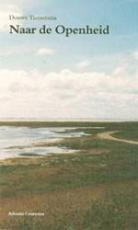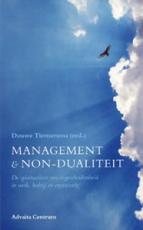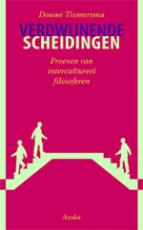Advaita Post 13 Nr. 14 - Constantly stay in the global awareness;...
July 26, 2012
--- Constantly stay in the global awareness; then the further development goes by itself ---
Even a staff doesn't offer a permanent hold
*****
You want to become free of your tension ties with the world?
Then let go of every tension inside you.
Then you become free for the world.
Then you become the world.
****
Rutger Kopland and the fleeting quality of life
Rutger Kopland died recently. From his poetry it was evident that he had a feeling for the groundless openness. That's why some of his poems have been included in our section "Non-duality in poetry and prose", including these below:
In the morning
There must be something when we go to sleep
we lay down and slip off
what was it then - while the last words
for the world became softer and softer:
moonlight, distant dog, soft breathing,
scents of a man, a woman,
night, night and then again - what was it
that said, even while the last word night
was extinguished: these are still our own arms
which we collapse into this black hole
this is still our own body
that said something, while there were no more words
there must be something now that the word morning
slowly illumines and the morning is
that which holds us together and releases
as we lie here
So he knew how to loosen something essential in his readers. If you want to read more, see: Kopland. [not translated]
With the death of Rutger Kopland there is again the disappearance of someone who was important to the social milieu of many people. He and others like him were important not only for what they produced, but especially because of the form they gave as beacons to the geography of cultural life. Everyone's living environment is composed of such markers. Everyone has their own design to this landscape in which parents, other relatives, teachers, politicians, singers, writers, etc. all have an important place. They form the backbone of your social milieu, the field of your life in which everything has to do everything else but in which there is nevertheless a structure. This field determines the individual life to a large extent and not always on a clearly conscious level. Usually it doesn't receive any special attention but, for example with family dynamics, this structure comes clearly to the surface when family matters are concerned. Even you have a very important place in your own life. You are in the center, but you also literally permeate your whole life. That forms more or less one whole, because you are more or less one whole.
Over time you see that the determining forms of your social milieu are not so fixed. The people who are relevant to you will die and won't be replaced. So your world becomes emptier. The structure that was a foundation for your milieu disappears. It seems fleeting. The people and things with whom you spoke and commented just a few years ago have now disappeared. "Times change".
This also applies to yourself as a person. The reality of that person consisted of relatively fixed properties which had a place in the network of relationships with people who were relevant to you. With the disappearance of those people, the individual person disappears, because new relationships can't form such a foundation for life as the old ones can. Life becomes more meaningless and empty.
The fleeting quality of life in this situation becomes very clear. Important people die and disappear. All kinds of beacons, the nodes in the network of your life disappear. With it, the net that is stretched beneath you and gives you a reason to live, disappears. A groundless openness manifests. This can no longer be sealed off by investing your energy in a reassuring home. The power of Maya is broken.
What's left over? Groundless openness. With the last remaining qualities: infinite being-self-being, consciousness and bliss, as endless openness. Beyond that: silence and an infinite potentiality.
All this in response to the death of Rutger Kopland who also wrote this poem:
Self-portrait
You see a man in the garden
he seems to be sunk in himself
I am this man, I know it
but if you look long enough at a photo
of yourself you fall into a reverie -
who you are and who you mean
when you say 'I', and so on
I look and look into that face
and indeed - am I that?
Much has been said about the 'I'
also by me, but the opinions,
just like mine, still
stretch far apart - something like that
always happens with words that can't
be understood
nobody has ever seen himself
but the longing for
the invisible 'I' still lingers
you seek in what remains of you
a man in the garden
*****
Text Satsang
Paths toward the position of insight
Advaita talk with Douwe Tiemersma, Schiermonnikoog, June 5, 2012
An important line of development is the steady and continual turning within in your own self-being, which is the further withdrawal to non-dual openness. It normally begins on the physical-bodily level with certain feelings about which you say: I myself am that. The attention turns back to there from its scattering in the external world. The attention goes in the direction of yourself as the source of the attention.
Then the experience remains direct. The experienced is not something else that you get to know through various concepts and models. A means is not necessary. It's a direct experience just like the bodily experience. It's direct because you are the experienced self. It's not remote. Also you are that which you are getting to know, what you experience. Being and knowing coincide. This is an immediate form of non-duality, a non-duality of being and knowing. This non-duality remains present even with further development.
A characteristic of this direct internal knowing is that you don't need to make any effort for it. You are that which you are conscious of. It's not an evaluation with criteria, it is a direct confirmation of what shows itself, what arises. Nothing more.
Is knowing the same as consciousness?
In a sense, yes. Consciousness is already there in mental knowing, but it is strongly mediated by the concepts contained within it. Here, the conceptual falls steadily away. It is a very passive presence and an internal knowing. Therefore, it can easily develop into the greater clarity of insight consciousness. Actually you skip over the whole phase of mental knowing. We have looked at it already quite often, but it's very important. So once again: how do you get this development, starting from the internal consciousness of your body, to the insight consciousness? You can easily arrange it. Then you use the tool of imagination.
Imagine that you see yourself at a distance. You create an image of it and then you perceive that image at a distance. As you hold that image a little longer, it appears as though that perception is no longer just an image. Why not? Because there, in that imaginary projection, the actuality of your bodily impressions and feelings are already present. Therefore the experienced is concrete, something you experience as a concretely present reality. That's why it's so important for you to remain steadily aware of your physical impressions and feelings. It insures the concrete quality of your entire experienced situation. These bodily impressions and feelings are located somewhere, in space. It's only there and not somewhere else. You can be very passive and you notice: this is present, without construction, without projection. So that is a possibility for getting closer to the insight consciousness, via this image of the body in space containing that distinct feeling, these impressions. You are experiencing the body and everything else as spatial phenomena. When you experience them like that, they are energetic phenomena. They cover a certain area, they are localized somewhere, they are dynamic, they don't have such fixed forms but they are forms.
That insight body, can you also experience it as silence?
First on the insight level, there is the position of your awareness where you experience phenomena at a distance. Even there, as consciousness, you appear to have a subtle body that we call the insight body. That slowly transitions into silence, as the subtle forms fall steadily away.
If you find the pathway to the insight level via an image too forced, there is also a softer way. Just stay with the concrete experience of your body without actively taking a distance and making and an image. When you stay with your physical feelings and impressions without taking a distance, some distance arises by itself, when you can experience them in space. You become aware of the space on either side of your body, front and back, above and below. Then more and more space comes by itself, the space of consciousness. You are going to experience the physical feelings and impressions as one whole. That is the feeling body. When you experience the whole feeling body in space you again have the direct position of spatial insight from which you can watch everything.
(...)
So you get a deeper withdrawal, a further return to the source of the experience that you yourself are. Stay alertly there, aware, relaxed. You settle in to that global awareness and it will develop by itself.
I notice that I still want to know more about it, but that seems to be manifesting on another level.
Now it's only about the direct experience. Nothing more. That is the movement that we are talking about. Leave the rest alone; just take a look. Can you become aware of your bodily feelings? Can you just stay with there, so that the space of insight arises? Then it is good. You will certainly need to go along, step by step, and then you can leave the rest alone. If you mentally say: I'd sure like to know more, then you have stepped out of the immediacy. It's about the direct experience. Stay with it. Then it's still a living thing.
(...)
In this way, you will become based in the viewpoint of the observer so that it's an effortless situation and you can totally relax and watch everything. "I am the effortless observer of everything that comes along." Let it remain so, very practically, very clear in that passive consciousness in which there is a direct confirmation of the whole situation and all aspects of the situation. Then everything will go by itself in a good way.
*****
Er is geen tweeheid
als je ontspannen bent
in zelf-bewustzijn
is dat duidelijk.
Boeken
Douwe schreef en redigeerde gedurende zijn leven boeken. Via onze uitgeverij zijn deze nog verkrijgbaar.



